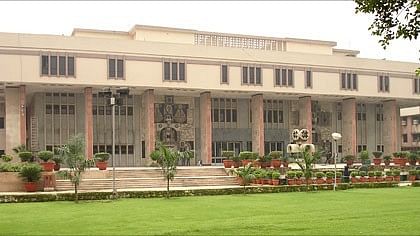
View of the Delhi High Court
Credit: delhihighcourt.nic.in
New Delhi: The Delhi High Court on Monday permitted a minority category student to attend classes amidst a purported seat allocation dispute between St Stephen's College and Delhi University (DU).
A bench of Chief Justice Manmohan and Justice Tushar Rao Gedela was dealing with the appeals filed by the college and the student against a single-judge's decision refusing to grant him admission. While allowing the student to attend classes, the court ordered no more allocation of such seats.
"The fact that the single judge in the judgement has found 18 students were entitled to admission in the St Stephen's College and one seat is vacant in the combination opted by the appellant student, the court, in the interim, permits him to attend classes till further orders," ruled the bench.
The high court underlined the college wouldn't make any further allocation of seats under the minority quota category till further orders. "Let it (any such vacant seats) go waste," the bench added.
The court was hearing appeals against the October 14 judgment of the single judge, who held 18 out of 19 students were entitled to get admission in the college on merits.
Before the single judge, the college had sought directions to DU to approve and upload the list of all the candidates from a minority community forwarded to it for approving their admissions.
On Monday, student number 19, in the appeal, stated a seat had turned vacant after another student had turned it down. The student, therefore, sought admission in the Bachelor of Arts course.
DU objected to the appeals and said the college could not be permitted to "juggle" its allotted seats by changing the seat matrix in this manner.
Appearing before the single judge, the DU claimed the college had allocated seats by not adhering to the seat matrix but according to “its whims and fancies”.
The college had, on the other hand, maintained the admission of the 19 students was within the permitted “sanctioned intake” and it had not exceeded its permissible limit.